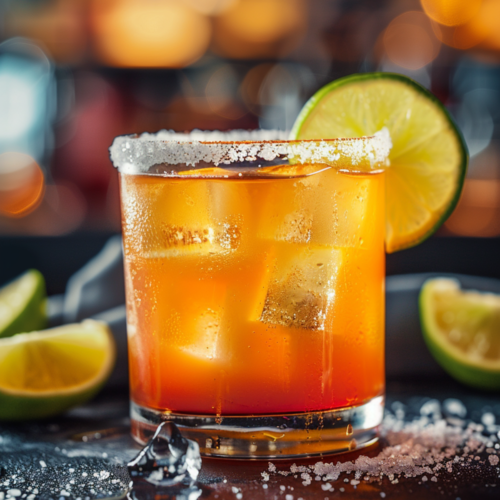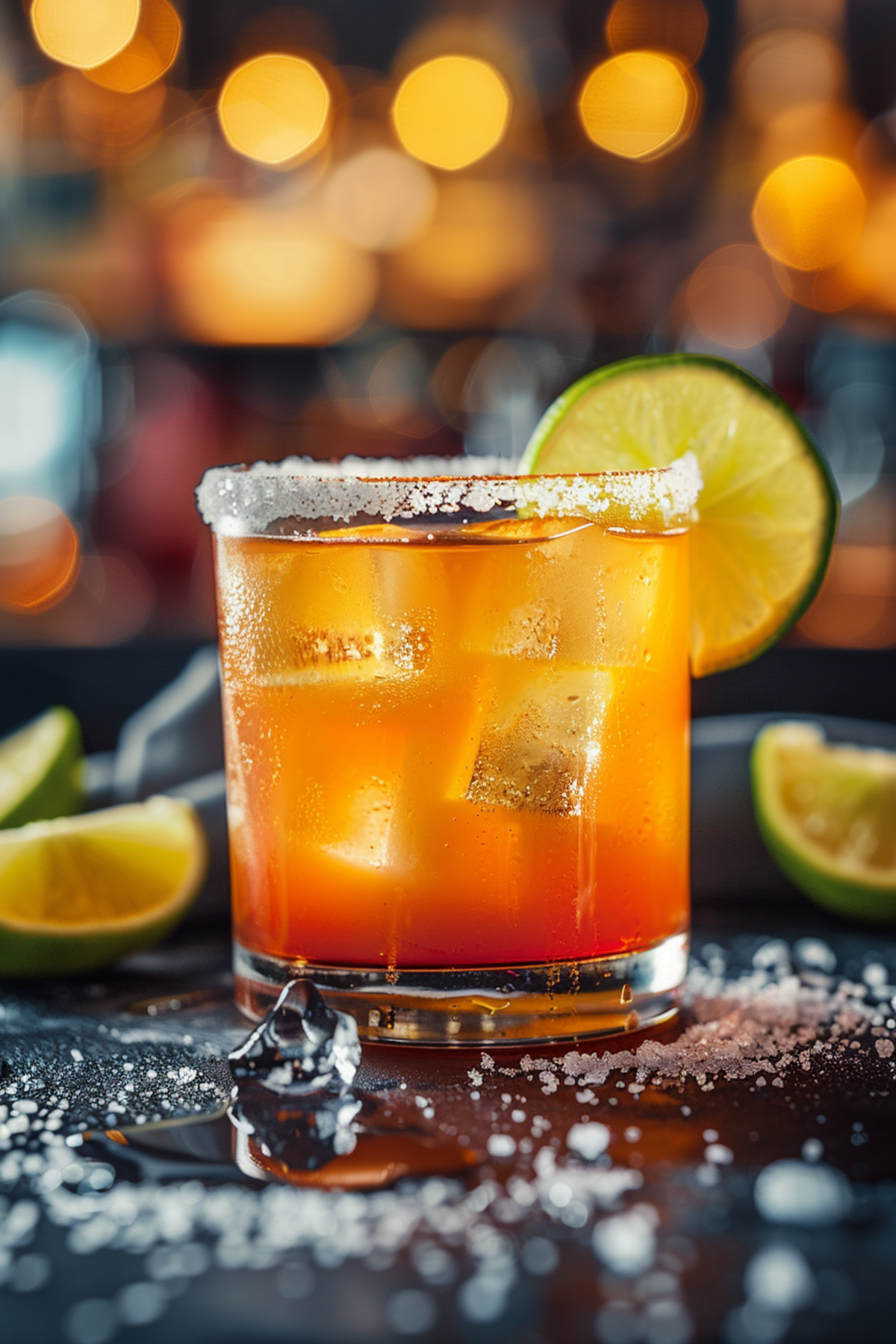Introduction to the Bitter Margarita
Discover the Bitter Margarita, a sophisticated twist on the classic Margarita. This cocktail blends the familiar tang of lime and the warmth of tequila with a hint of bitterness from Campari. It’s a drink that promises to tantalize your taste buds with its complex flavor profile.
The Bitter Margarita is not just a cocktail; it’s an experience. Whether you’re a seasoned mixologist or a curious enthusiast, this drink offers a refreshing change from the ordinary. Let’s dive into the world of this bittersweet sensation.
Join us as we explore the allure of the Bitter Margarita. From its intriguing flavor notes to its vibrant history, this cocktail is sure to become a new favorite. Perfect for a summer evening or a cozy night in, the Bitter Margarita awaits.
Key Facts About the Bitter Margarita
Alcohol Content: Approximately 22% ABV (44 proof)
Calories: Approximately 200 kcal
Carbohydrates: Approximately 17 g
Preferred Glass: Rocks glass
Typical Garnish: Lime wheel
Interesting Facts about the Bitter Margarita
- The Bitter Margarita is a modern take on the classic, appealing to those who appreciate a more complex flavor.
- Its unique combination of ingredients has made it a favorite among cocktail aficionados looking for something out of the ordinary.
- The addition of Campari introduces a bittersweet dimension that perfectly balances the cocktail’s sweetness and acidity.

Tasting Notes
The Bitter Margarita offers a harmonious blend of sweet, sour, and bitter. The sharpness of the lime juice cuts through the sweetness of the orange liqueur, while the Campari adds a sophisticated bitter edge. It’s a cocktail that’s both refreshing and complex.
This cocktail is perfect for those who enjoy a drink with depth. It’s ideal for sipping on a warm day or as a palate cleanser before a meal. The Bitter Margarita is versatile, fitting for both casual gatherings and formal celebrations.
Its bold flavors make the Bitter Margarita a standout choice for the adventurous drinker. It’s a cocktail that commands attention and leaves a lasting impression. If you’re looking to impress, this is the drink to serve.
History of the Bitter Margarita
The Margarita’s origins are shrouded in mystery, with several claims to its invention. However, the Bitter Margarita is a more recent innovation. It’s a testament to the enduring popularity of the Margarita and the creativity of modern mixologists.
This variation was born out of the desire to add complexity to the classic recipe. By introducing Campari, a beloved Italian aperitif, the Bitter Margarita bridges the gap between traditional Mexican flavors and European bitter liqueurs.
The Bitter Margarita has quickly gained a following. It’s a symbol of the evolving cocktail scene, where classic recipes are reimagined to suit contemporary palates. This drink is a celebration of both history and innovation.
Bitter Margarita Ingredients
- Tequila (2 oz): The backbone of any Margarita, providing a smooth, agave-based kick.
- Fresh Lime Juice (1 oz): Adds a necessary citrus zing, brightening the overall flavor profile.
- Orange Liqueur (3/4 oz): Brings a sweet, fruity balance to the cocktail’s sharpness.
- Campari (1/2 oz): Introduces a bitter complexity that defines this Margarita variant.
- Agave Syrup (1/2 oz, optional): Offers a touch of sweetness to mellow the bitterness, if desired.
- Lime Wheel: A classic garnish that adds visual appeal and a hint of lime aroma.
- Salt (optional): For rimming the glass, enhancing the cocktail’s flavors with a savory note.
Did you know? The Bitter Margarita’s use of Campari is a nod to the Italian tradition of aperitivo, blending cultures in a single glass.

Bitter Margarita Method
Preparation
Begin by rimming your rocks glass with salt if desired. This adds a savory layer that contrasts beautifully with the cocktail’s sweetness and acidity.
Combining Ingredients
In a cocktail shaker, mix the tequila, lime juice, orange liqueur, and Campari. If you prefer a sweeter drink, include the agave syrup. This step is crucial for marrying the flavors together.
Shaking
Fill the shaker with ice and shake vigorously. This not only chills the drink but also dilutes it slightly, softening the alcohol’s bite.
Serving
Strain the mixture into your prepared glass filled with fresh ice. The fresh ice ensures your drink stays cold without becoming overly diluted too quickly.
Garnishing
Finish by adding a lime wheel garnish. It’s the perfect final touch that adds an extra hint of lime to every sip.
Serving Suggestion
The Bitter Margarita is best served in a rocks glass. This glassware is ideal for the drink’s bold flavors and allows for the perfect amount of ice to keep it chilled.
Garnish with a lime wheel to enhance the visual appeal and aromatic experience. If you’ve chosen to rim the glass with salt, it provides a tactile element that complements the cocktail’s flavors.
Elevating the Bitter Margarita
- Quality Ingredients: Use premium tequila and fresh lime juice for the best flavor.
- Proper Technique: Shake the cocktail until the shaker feels cold to ensure optimal dilution and temperature.
- Balance: Adjust the Campari and agave syrup to find the perfect balance between bitter and sweet for your palate.

Substitutions and Alternatives for the Bitter Margarita
If Campari is not to your taste, consider using Aperol for a slightly sweeter and less bitter alternative. For a non-alcoholic version, use a bitter non-alcoholic aperitif.
Similar cocktails include the Classic Margarita, for those who prefer a more traditional taste, or the Negroni, for those who enjoy the bitterness of Campari.
Add a Twist
Consider adding a splash of grapefruit juice for a Paloma-esque Bitter Margarita. Alternatively, muddle in some fresh jalapeño for a spicy kick.
For a smoky variant, use mezcal instead of tequila. This adds a new dimension to the cocktail’s flavor profile.
Preferred Liquors for the Bitter Margarita
Opt for a high-quality blanco tequila for its clean, agave-forward flavor. Brands like Patrón Silver or Don Julio Blanco are excellent choices.
When it comes to orange liqueur, Cointreau or Grand Marnier provide the right balance of sweetness and complexity.
Similar Cocktails to the Bitter Margarita
If you enjoy the Bitter Margarita, you might also like the Mezcal Negroni for its smoky bitterness or the Aperol Spritz for a lighter, bubbly option.
The Boulevardier offers a whiskey-based alternative with a similar bitter profile. Each of these cocktails shares a component of complexity and depth.
Food Pairings to go with the Bitter Margarita
Classic Mexican dishes like tacos or ceviche pair wonderfully with the Bitter Margarita. The cocktail’s acidity and bitterness cut through the richness of the food.
For a more unconventional pairing, try it with sushi. The cocktail’s clean flavors complement the delicate taste of the fish.
Bitter Margarita FAQs
Can I make a Bitter Margarita without orange liqueur? Yes, but the cocktail will lack some sweetness and depth. Consider adding a touch more agave syrup to compensate.
Is there a non-alcoholic version of the Bitter Margarita? Absolutely. Use a non-alcoholic tequila alternative and a bitter non-alcoholic aperitif to mimic the cocktail’s flavors.
How can I make my Bitter Margarita less bitter? Reduce the amount of Campari and increase the agave syrup to find your perfect balance.

Bitter Margarita
Equipment
- Cocktail shaker
- Rocks glass
- Jigger or measuring tool
- Citrus juicer
Ingredients
- 2 oz Tequila 60 ml
- 1 oz Fresh lime juice 30 ml
- 3/4 oz Orange liqueur e.g., Cointreau or Triple Sec, 22 ml
- 1/2 oz Campari 15 ml
- 1/2 oz Agave syrup optional for sweetness, 15 ml
- Lime wheel for garnish
- Salt for rimming the glass (optional)
Instructions
- If using salt, rim the edge of a rocks glass with a lime wedge and dip into salt to coat. Fill the glass with ice and set aside.
- In a cocktail shaker, combine tequila, lime juice, orange liqueur, Campari, and agave syrup if desired.
- Fill the shaker with ice and shake vigorously for about 15 seconds.
- Strain the mixture into the prepared rocks glass filled with fresh ice.
- Garnish with a lime wheel.

